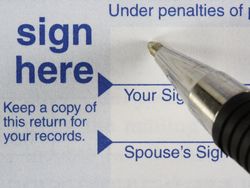 Married taxpayers who file their income tax returns jointly enjoy tax benefits that may help reduce the amount of taxes they owe. Yet this benefit comes at a price. Many married couples don’t realize that each taxpayer is equally responsible under penalties of perjury for verifying that filed income tax information is correct, and for paying the tax. Errors, omissions and even purposeful untruths filed by one spouse are the responsibility of both. This is true even after a subsequent divorce. Of course, that’s where things can get a bit “sticky”.
Married taxpayers who file their income tax returns jointly enjoy tax benefits that may help reduce the amount of taxes they owe. Yet this benefit comes at a price. Many married couples don’t realize that each taxpayer is equally responsible under penalties of perjury for verifying that filed income tax information is correct, and for paying the tax. Errors, omissions and even purposeful untruths filed by one spouse are the responsibility of both. This is true even after a subsequent divorce. Of course, that’s where things can get a bit “sticky”.
When filing jointly, both married taxpayers do so under the legal concept termed “joint and several liability.” The definition means that each taxpayer is legally responsible for the entire liability, even if they are not responsible for a mistake or omission. Subject to some limited exceptions discussed below, each spouse is considered “jointly and severally” liable for the taxes owed and any additions for interest or penalties that may arise from information reported on the joint return. This is true even if they later divorce.
Each spouse or former spouse is potentially responsible for all the tax due, even though only one spouse may have earned all the income and/or claimed improper deductions and/or credits. Even if a judge’s divorce decree holds a former spouse responsible for amounts due on previously-filed joint returns, the IRS may reach beyond that holding to enforce federal income tax collection mandates on both or either taxpayer until the taxes owed are paid or an agreement for relief is settled.
There are only 3 types of relief from joint and several liability that are available to spouses and ex-spouses who filed joint returns that later turned out to contain mistakes or purposeful errors.
The first and most often claimed type of liability release is Innocent Spouse Relief. To qualify, a taxpayer must show that any error revealed on a joint return was solely attributable to the spouse or ex-spouse. It must also be shown that at the time the error was submitted the taxpayer had no knowledge and no reason to know that an error was made. The innocent taxpayer must establish that it would be unfair to hold them solely accountable for the consequences.
The second type of claim a taxpayer may use is Separation of Liability Relief. To qualify, a taxpayer must show that he or she is responsible for only a portion of the additional tax owed. It is a request to split the tax liability between the taxpayer and a former spouse or current spouse from whom the taxpayer is separated based upon corrected information. The taxpayer would then pay only the proven part of the outstanding tax, penalties and interest for which the taxpayer is individually responsible.To qualify for this type of relief, a taxpayer must be divorced or legally separated from the spouse with whom the joint return was filed, or be widowed. The taxpayer may not have been a member of the same household of the spouse or ex-spouse within a 12-month period of the request.
You must file for the Innocent Spouse or Separation of Liability Relief no later than 2 years after the IRS tries to collect any unpaid taxes, penalties and/or interest. When a request for relief is made, the IRS must notify the spouse with whom the joint return was filed and allow him or her to provide information for consideration regarding the claim.
A final form of innocent spouse tax liability relief is Equitable Relief, which may apply if the tax reported is correct on the joint return, but the tax was not paid. It is also the relief that an abused spouse may claim if they knew the tax return was erroneous, but signed the tax documents fearing retaliation. The IRS may take into account whether additional tax liability may create a significant economic hardship.
 This relief is not to be confused with regulations that apply to an “injured” spouse in which all or part of that taxpayer’s refund from a joint return was captured to satisfy a separate past-due federal or state tax liability of the spouse or ex-spouse, child support or federal non-tax debt such as a student loan. If a taxpayer can prove that they qualify, he or she may be able to recoup his or her share of a refund by filing for an Injured Spouse Allocation.
This relief is not to be confused with regulations that apply to an “injured” spouse in which all or part of that taxpayer’s refund from a joint return was captured to satisfy a separate past-due federal or state tax liability of the spouse or ex-spouse, child support or federal non-tax debt such as a student loan. If a taxpayer can prove that they qualify, he or she may be able to recoup his or her share of a refund by filing for an Injured Spouse Allocation.
These kinds of situations are painful enough without having to argue about taxes. If you have questions, call us for a confidential consultation at 816.741.7882 or connect with us online.
 is now
is now 
